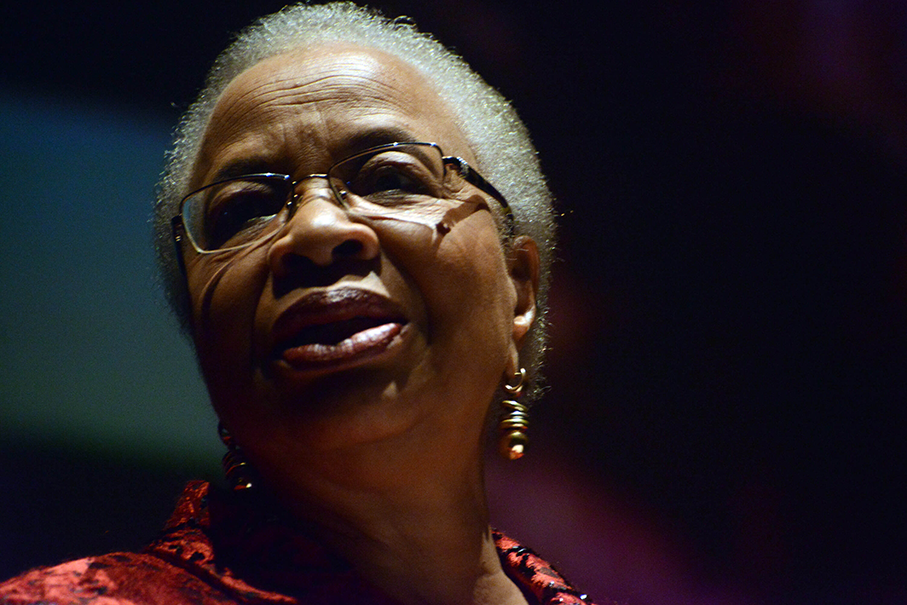Conference kicked off the 2019 season of cultural event sponsored by PUCRS

Graça Machel is an activist recognized for fighting for black peoples’, women’s and children’s rights | Image: Luiz Munhoz
“Please, forget that I am a black, African woman. Just think of me as a human being who is as human as you are”. These were the words of Graça Machel at the beginning of the first conference of Frontiers of Thought in 2019, a cultural event that is sponsored by PUCRS. The Mozambican activist addressed the theme Respect for human dignity, a cause she has been fighting for over a number of decades in an effort to stand up for race and gender equality as well as the right to religious freedom in different regions. In her view, everyone is equal, regardless of external forms and several identities. “We die and live in the same way”, Graça said, in the evening of May 13, at the Commencement Hall of UFRGS.
In view of Frontiers of Thought’s main theme Meaning of Life, Graça discussed issues related to the nature of the body and how all human beings are connected by the “spark of life”, which is created at the moment of birth. She highlighted the importance of diversity although she claimed that the differences in the “fabrication” have no value. She also made it clear that we have not been able to clarify all mysteries of the universe. Hence, she believes is a much stronger force, which results from religions.
The normalization of social stratification
One of the points brought forth by Graça was the mutual acceptance of human beings. She was sorry about the war against the poor, women, developing regions and nature. She added that this creates psychological barriers and stratification. The way she sees it, when a human being is deprived of their dignity, everyone’s dignity is at stake.
Graça also asserted that no country on the planet could say it treats women as complete human beings. “Having 30% or 40% of women in the senate is something to be celebrated. But why not have 50%? Women have even become naturally conditioned to accept this”, she pointed. She also mentioned that blacks are overlooked in the process of creating laws that have an effect on society. However, these people play a very important role and have a lot to add to development. She got the audience to wonder: “Should we accept or defy these differentiations? ”.
“Nature is angry and it sends us signals”
In her talk, Graça conceptualized Nature as an entity that has created human beings and the resources for them to live in harmony. As for natural disasters, she claimed that “nature is angry and it sends us signals”. She stressed the need to live a balanced life as she stated that Nature made “such a perfect machine, the human body”. The activist questioned the relevance of items that are basic to survival and to comfort in relation to greediness, which has destroyed natural resources. “Human families have decided that they need more than just the necessary. And so, this brought about the excesses and accumulation. We have produced relations of power in which some people can impose themselves over others, and claim to be superior”, she pondered.
Next generations and social movements
Graça stated that every generation has their own challenges, and that “the coming generations now need to redefine their goals and the reasons why we are here”. She believes that, despite the comfort brought forth by the new technologies, people need eye-to-eye communication in order to think of the “spark of life”, a term she mentioned many times over her speech.
One of the things she loves the most has been discussed: social movement activism. She asked the audience some questions: “What makes our stay (on Earth) rich? How do we touch on each other’s hearts? How can we share? What are we here for? ”. She shared her own examples of life and added: “Social movements allowed for my country, Mozambique, to be free since we had a cause to fight for”.
Toleration versus acceptance
At the end of the conference, Graça was questioned by journalist Tulio Milman about the difference between toleration and acceptance, concepts she worked on in her presentation. She claimed that toleration creates an element of tension and implies value judgment on people, unlike in acceptance, as you acknowledge each other’s right to choose. “We got roles, but no one is superior that the other”, Graça explained, under a round of applause.
Her career
Graça Machel has a long history of fights for black people’s, children’s and women’s international rights. She made her presence felt at the Mozambican Liberation Front (Frelimo) and the Armed Fight for National Liberation. In 1976, in the company of her husband and president of Mozambique, Samora Machel (1933 – 1986), she served as Minister of Education and Culture. In the 1990s, she was appointed by the United Nations (UN), for the Study of the Impact of Armed Conflicts in Childhood. Her work was awarded with the Nansen Medal, by the Office of the United Nations High Commissioner for Refugees (ACNUR), in 1995. Her engagement to these actions led her to meet her second husband, Nelson Mandela, whom she was married from 1998 until the day he died, in 2013.